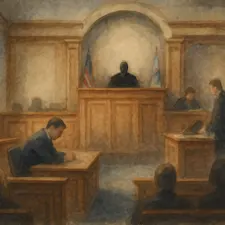
Trump-Backed Effort Seeks to Unseal Epstein Documents — What Could Be Inside?
The name Jeffrey Epstein has become synonymous with scandal, secrecy, and speculation. Nearly five years after his death in a Manhattan prison, his shadow still looms large over high-profile figures and government agencies alike. Now, a newly formed congressional task force is aiming to pull back the curtain on one of the most discussed mysteries of the Epstein saga — his so-called "client list."
The Push for Transparency
A new investigative unit under the House Oversight Committee has taken on the ambitious task of reviewing classified materials related to major government interests. Led by Republican Rep. Anna Paulina Luna, the task force is considering the release of numerous confidential files, including those tied to the Sept. 11, 2001 terrorist attacks, the origins of COVID-19, UFOs, and Epstein's records.
The move follows recent political momentum for government transparency. Former President Donald Trump recently signed an executive order to declassify records related to the assassinations of John F. Kennedy and Martin Luther King Jr., fueling calls for even broader disclosures. According to Rep. Luna, the goal is to "end an era of secrecy" and ensure the public has access to information they've long been denied, as reported by the Independent.
What's in the Files?
The term "client list" has become a catch-all phrase, often used to refer to Epstein's vast web of associates, flight logs, and financial dealings. Some of these details have already been made public, including portions of his infamous "black book." This book contained the names of many high-profile individuals, such as former President Bill Clinton, billionaire Bill Gates, and even Trump himself. However, no allegations of misconduct have been made against these figures.
What remains unclear is whether these declassified files will contain new information distinct from what has already been revealed in past legal proceedings. Eleven letters have already been sent to top U.S. security and intelligence officials, requesting briefings on what documents exist concerning Epstein's investigation and prosecution.
Political and Legal Barriers
Despite the aggressive push for declassification, not everyone is convinced that Epstein's records will see the light of day. Rep. Tim Burchett, a Republican committee member, has openly expressed doubts, suggesting that federal agencies have little motivation to comply fully. Calling the FBI as "crooked as a dog's leg," according to the Independent, Burchett noted that past requests for information on high-profile cases, including the JFK assassination, have resulted in little transparency.
Additionally, declassifying documents related to Epstein could bring a wave of legal battles. Many of the individuals named in his records have never been charged with any crime, meaning their inclusion in any released files could spark defamation lawsuits and legal challenges against the government.
Trump's Role in the Declassification
While the congressional task force is spearheading the investigation, Trump's influence looms large. Having distanced himself from Epstein following their falling out in the late 1990s, Trump has repeatedly denied any connection to Epstein's abuse network. However, past flight logs show that he flew on Epstein's private jet multiple times, sometimes with his children and other associates.
Interestingly, Trump's own attorney general, Pam Bondi, has echoed calls for declassification, specifically pointing to Bill Clinton's alleged frequent travel on Epstein's plane. Clinton, for his part, has denied this assertion, as reported by the Independent.
Public Reaction and Speculation
The potential release of Epstein's records has reignited widespread speculation and public demand for accountability. Online forums and social media are buzzing with theories about what might come to light, with many calling for full transparency regardless of political affiliations.
However, skeptics warn that even if some documents are released, they may be heavily redacted or lack the explosive revelations that many anticipate. The FBI has a long history of withholding critical details in national security-related cases, making it unclear how much information the public will actually receive.
What Happens Next?
If the congressional task force is serious about transparency, the pressure will be on to ensure government agencies comply with information requests.
For now, all eyes are on Washington as lawmakers weigh whether to finally unseal what may be one of the most controversial document releases in recent history.
References: New congressional task force weighs declassifying Jeffrey Epstein's 'client list' and other government secrets | Jeffrey Epstein's 'client list' will be declassified by Trump | Jeffrey Epstein's 'client list' is among files to be released by Trump's task force























